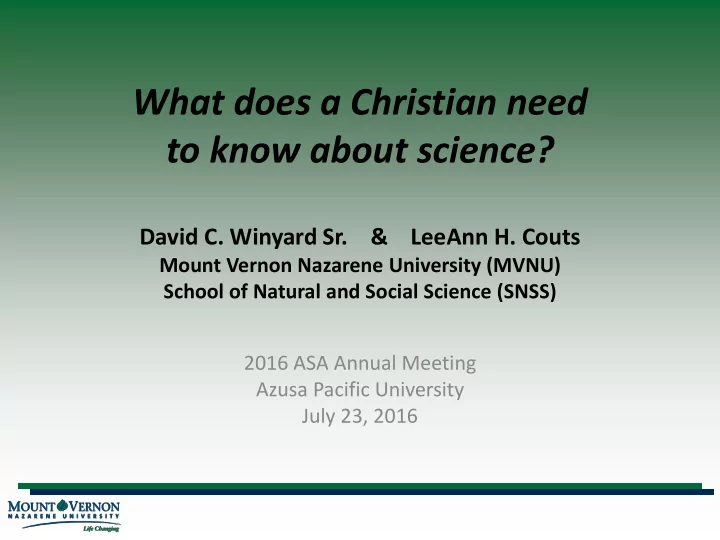

What does a Christian need to know about science? David C. Winyard Sr. & LeeAnn H. Couts Mount Vernon Nazarene University (MVNU) School of Natural and Social Science (SNSS) 2016 ASA Annual Meeting Azusa Pacific University July 23, 2016
Abstract Mount Vernon Nazarene University (MVNU) is a Christian, co-educational, liberal arts, teaching institution based in the Wesleyan-holiness tradition. In fall 2014, MVNU added a new class to its General Education Core: Science and the Modern Mind. This two-credit class, which is required for all graduates, “explores science from philosophical, historical and cultural perspectives, examining both the robust character of scientific inquiry and its limitations.” Drawing on resources from science, history, and theology, it examines the question: “How do— and how should —science and faith relate?” To date, several members of MVNU’s School of Natural and Social Sciences have taught Science and the Modern Mind using a number of different approaches. In spring 2016, yet another method employed When God and Science Meet , a National Association of Evangelicals (NAE) booklet produced in 2015 with American Scientific Affiliation support. MVNU’s experience launching and teaching this class, and its use of the NAE booklet, provide insights into the challenges Christian universities face developing students that are prepared to live out their faith in today’s technoscientific world. 2
A Need for Science-Faith Conversations • In 2011 MVNU revised its General Education curriculum to emphasize faith integration. • A new science-faith integration course, to be taught by SNSS faculty, emerged: Science and the Modern Mind . 3
Science and the Modern Mind Course Objectives 1. Identify the branches of science and describe the application of scientific method in each discipline; 2. Critique the potential strengths and limitations of scientific inquiry; 3. Interpret some of the major shifts in scientific thought and the social and historical context that made them possible; 4. Describe and assess the social and ethical impact of major scientific discoveries; 5. Describe the development of the perceived conflict between science and Christianity; 6. Assess the development of conflict between select scientific theories with various biblical interpretations; 7. Evaluate some of the ways scientists of faith reconcile their understanding of science with the biblical narrative. 4
General Course Goals • Encourage student reflection and discussion of science-faith issues: – Not an apologetics course. – Promote open-mindedness. – “ It is the mark of an educated mind to be able to entertain a thought without accepting it. ” – Aristotle • Promote humble, respectful discourse: – Encourage individuals “ with diverse views on science and faith to accept one another with love and respect in the body of Christ “ – Randy Isaac, President ASA 5
The Journey of Course Development • 2012 – 2013: SNSS book club: – James Hannam, The Genesis of Science: How the Christian Middle Ages Launched the Scientific Revolution (2011). – Gary Ferngren, Science and Religion: A Historical Introduction (2002). • May 2013: Two-day workshop with Ted Davis , History of Science Professor, Messiah College. • 2013 – 2014: Weekly meetings of participating SNSS faculty. • 2014 – 2015: Course rollout (four sections). 6
General Approach • Used a two-book narrative approach: God’s truth is revealed in Scripture and nature. • Sought balance on science-faith issues. • Discussed the strengths and limitations of a range of Christian views on particular topics. The heavens declare the glory of God, and the sky above proclaims his handiwork… The law of the Lord is perfect, reviving the soul; the testimony of the Lord is sure, making wise the simple… Psalm 19: 1 & 7 7
Resources Used • Bryson & Dixon texts. • Additional readings & videos. • Test of Faith documentary. • Guest speakers: – Theologians – Physicist – Geologist – Biologists – Anthropologist – Psychologist – Neuroscientist 8
Course Challenges • Provide personal position or remain neutral? • Meaningful in-class discussions with 60 students? • Some general hostility to controversial topics (e.g., big bang, biological evolution, age of earth). • Mixed student responses: “I really liked how this “ This course should not course talked about hard be taught at a Christian topics to discuss in a university .” Christian environment .” 9
A new a pproach… • In 2014 MVNU launched its General Engineering Program, with Winyard as its first professor: – BSME Univ. of Maryland, MSME Univ. of Rochester. – MS Science & Technology Studies (STS), Virginia Tech. – Ph.D. dissertation defense, fall 2016. • Science and the Modern Mind , spring 2015: 1. Establish baseline dialogue. 2. Explore selected natural, social, & applied sciences. 3. Reveal their strengths, challenges, & meanings. 4. Respect different views of Scripture and culture. 10
1. Establish baseline dialogue. • The National Association of Evangelicals (NAE) produced this 2015 booklet supported by: – The American Association for the Advancement of Science (AAAS). – John Templeton Foundation. – American Scientific Affiliation. • Ten short essays cover many course-relevant topics. • Primarily on natural science. • Booklet was supplemented by articles and web sites. 11
2. Explore selected natural, social, & applied sciences. 12
3. Reveal their strengths, challenges, & meanings. • Kuhn’s classic introduces the social construction of science. • Paradigm shifts demonstrate the limitations of science. • Per Ian Barbour, paradigms affect science and religion. 13
4. Respect different views of Scripture and culture. • Niebuhr presents five Christian approaches to culture, including science, & technology. • Evangelicals tend toward the “Christ, the transformer of culture” view. • Nevertheless, each type finds justification in Scripture. 14
Science and the Modern Mind Class Distribution – Christ and Culture Types Pre-Course Christ ... N=44 …Culture 15
Science and the Modern Mind Class Distribution – Christ and Culture Types Post-Course Christ ... N=24 …Culture 16
Conclusions • MVNU is taking a pro-active approach to science-faith integration. • Several teaching approaches have met with both success and resistance. • Dialogue with other schools facing similar challenges is welcomed. 17
Recommend
More recommend